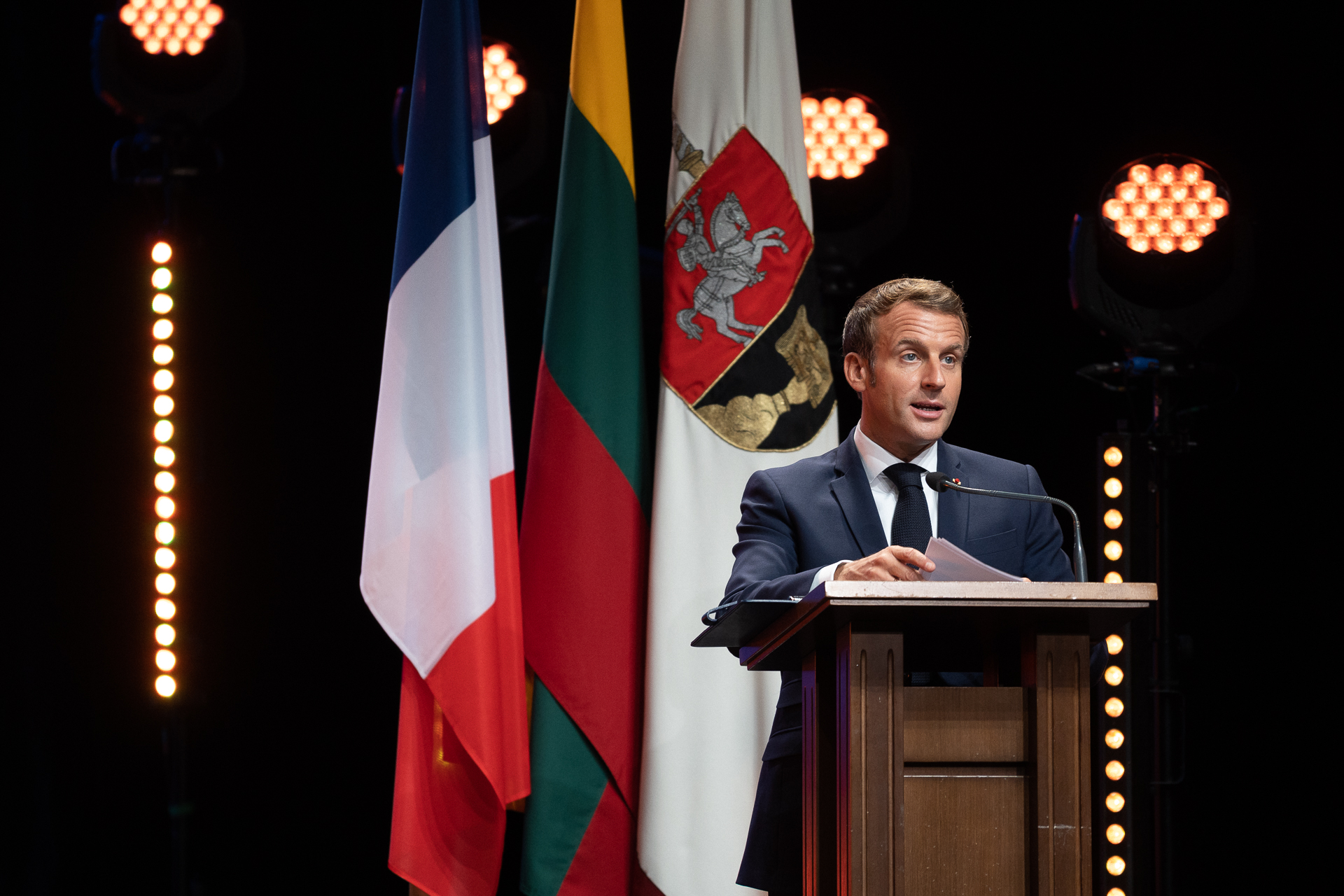Speech by French President Emmanuel Macron at the Award Ceremony of Doctor Honoris Causa of Vilnius University
 Dear Rector, Senate Members, ladies and gentlemen,
Dear Rector, Senate Members, ladies and gentlemen,
I would like to thank you sincerely for your words, and it is a great honour for me to receive this title here in the heart of Vilnius Old Town and that this honourable degree has been awarded to me by one of the oldest and most renowned universities in Europe, which has recently marked its 440 years of existence.
Famous students, such as Czesław Miłosz, Tomas Venclova used to sit here on the benches of this University, studying devotedly. Famous lecturers gave lectures in these audiences, including Algis Piskarskas, who collaborated with Gerard Mourou, a Nobel laureate in physics – he was the last Frenchman to receive the same title that I have the honour to receive today.
Your University and France have old ties. French botanist Jean Emmanuel Gillier was the first to describe the Lithuanian flora at the end of the 18th century. In 19th century, zoologist Ludwig Heinrich Bojanus taught here veterinary medicine and later, from 1806 to 1824, comparative anatomy.
The inherent European origins of Vilnius University still exist today. Every year, this prestigious University attracts international students that fill its auditoriums. Among those students are French citizens. Last year, there were about 400 of them studying at various Lithuanian universities.
Vilnius University is the guardian of the traditional culture of Lithuania and the memory of the Grand Duchy of Lithuania. The Grand Duchy of Lithuania at the time of the Polish–Lithuanian Commonwealth showed the Renaissance Europe a great example of openness and tolerance. It should be noted that your University is also very modern and is always looking to the future which is proved by your scientists being regularly awarded international prizes.
Dear Rector, ladies and gentlemen, you are well aware that Europe and its young people are at the heart of my vision. 3 years ago in Sorbonne, I proposed setting up European networks of universities to combine our scientific traditions on common projects. European universities were enthusiastic about this proposal and 24 such university networks have already been established. I am delighted that the faculties of France and Lithuania actively participate in them thus strengthening their relations. After the announcement of the first two projects, our countries joined four consortia, one of them connecting Vilnius and Lyon universities.
Perhaps young people in Europe have never spoken as many languages as today, and in this regard, Lithuania is a good example for us. Young people in Europe have never been as open as today, but they are still worried. They are worried about their future. Especially at a time, as I said to your students, when we ask them a great deal of effort. Young people want to act, to combat climate change, to create an international order that is fairer and more respectful of human rights. This sometimes gives rise to fears and risks in the hope that digital technology will influence our opinion, and allow us to react to events very instinctively and emotionally. We need young people able to commit, share, learn and build the future of our Europe.
That is why I believe that this European university project, in which you are participating, is very important. This is a project that allows our students from different locations to learn together, our teachers to teach together and create joint projects, and our scientists are able to associate their own work in the same way. I am convinced that it is through knowledge, through culture, through learning, through language learning that we will be able to move ahead in Europe and allow our young people to turn those concerns into something good, because we will give them the opportunity to do so, to realise it.
Mr. Rector, ladies and gentlemen, I want to point out that Vilnius University, its professors and students have done a great job in maintaining the European ideal and have left a deep mark in the culture of our continent. Occupying authorities closed the University twice – the authorities that used ideology to choke your curiosity and your desire to understand the world. On both occasions, the University was able to survive and today bases its teaching on the tradition of humanism, critical thinking and openness to the world. Therefore, it is a great honour for me to be here today, I am proud of this title and I want to thank you sincerely.
I would like to thank your University, your city, and I am delighted at the strong friendship between Lithuania and France.
Long live Europe!